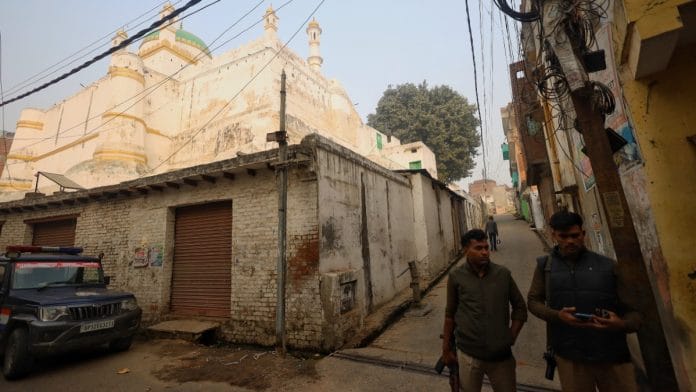New Delhi: While hearing a plea challenging a court-ordered survey of the Shahi Jama Masjid in Uttar Pradesh’s violence-hit Sambhal, the Supreme Court Friday asked the petitioners to approach the Allahabad High Court and directed the Sambhal trial court not to proceed in the matter until the case was heard.
The court also ordered that the report of an advocate commissioner, who conducted the survey of the mosque, be kept in a sealed cover in the meantime.
Four people died and many including police personnel were injured in clashes in Sambhal last Sunday following the trial court’s survey order, which came on the back of a petition that a Harihar temple once stood at the site. The violence broke out after a six-member survey team visited the mosque for the second time in less than a week, to honour the 19 November order.
Hearing the petition filed by the mosque committee, Chief Justice of India Sanjiv Khanna told Additional Solicitor General K.M. Nataraj—appearing for the UP administration—that peace and harmony had to be maintained. “We don’t want anything to happen…We have to be absolutely, totally neutral and ensure nothing wrong is done,” Khanna said as he heard the plea along with Justice Sanjay Kumar.
Meanwhile, UP Governor Anandiben Patel has formed a three-member judicial inquiry commission to probe the 24 November violence, directing it to complete its inquiry within two months.
In a notification issued Thursday, Patel highlighted the necessity of conducting a “thorough inquiry to serve the public interest and ensure transparency”.
The inquiry commission will be headed by Justice Devendra Kumar Arora, a retired judge of the
Allahabad High Court. The other members include Amit Mohan Prasad, a retired IAS officer, and Arvind Kumar Jain, a retired IPS officer.
The commission would examine whether the incident was a spontaneous event or part of “a planned criminal conspiracy”, as well as look into whether the Sambhal district administration was adequately prepared to maintain order during the survey that day.
The findings were crucial, the government notification read, to prevent such incidents in the future.
Incidentally, the apex court is also hearing petitions relating to similar disputes over the mosques in the Gyanvapi complex in Varanasi and the Shahi Eidgah Mosque in Mathura.
Also read: Muslim men who died in Sambhal riots had stepped out for work, errands. ‘Police killed my young son’







The Indian Supreme Court is always there to protect criminals, thugs and hooligans.
In other nations though, the judiciary protects innocent people.
Good decision. Let revenge not be the driving force otherwise its another civil war waiting to happen.